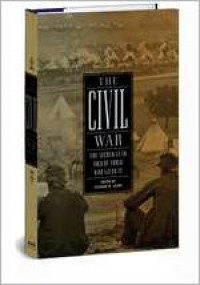The Civil War: The Second Year Told by Those Who Lived It
 The second volume of the Library of America’s primary-source history of the Civil War. What’s great about this series is the variety of voices. There are first-hand accounts of battles and political speeches, but also essays and other things from the likes of Herman Melville, Walt Whitman, Louisa May Alcott, Frederick Douglas, and Ralph Waldo Emerson. (19th century American literature is so amazingly rich.) This volume charts 1862, (spoiler alert) the year of the strongest Confederate advance and the Emancipation Proclamation. (If anyone cynically thinks the Emancipation Proclamation was just a pragmatic tool to keep England and France out of the war, read the essays by Douglas and Emerson reacting to it. American freedom in the sense that we know it was born with the Proclamation.) Also documented here is Lincoln's increasing frustration with General Wishy-Washy McClellan. We've all worked with McClellans--otherwise smart and capable people who constantly pull out excuses why things can't be done--and Lincoln barley maintains his Lincoln-esque demeanor in his letters to him. (Not included is when he finally snaps and tells him, I'm paraphrasing, "You're telling me your horses are tired? Really? Tired? What the hell have you been doing to make them tired? You haven't been doing shit.") The soldiers' accounts of battles all follow a similar pattern, no matter what the battle or which side they are on. They begin with tactics and some account of how they got to where they are, but then they all just become a catalog of gruesome horrors.
The second volume of the Library of America’s primary-source history of the Civil War. What’s great about this series is the variety of voices. There are first-hand accounts of battles and political speeches, but also essays and other things from the likes of Herman Melville, Walt Whitman, Louisa May Alcott, Frederick Douglas, and Ralph Waldo Emerson. (19th century American literature is so amazingly rich.) This volume charts 1862, (spoiler alert) the year of the strongest Confederate advance and the Emancipation Proclamation. (If anyone cynically thinks the Emancipation Proclamation was just a pragmatic tool to keep England and France out of the war, read the essays by Douglas and Emerson reacting to it. American freedom in the sense that we know it was born with the Proclamation.) Also documented here is Lincoln's increasing frustration with General Wishy-Washy McClellan. We've all worked with McClellans--otherwise smart and capable people who constantly pull out excuses why things can't be done--and Lincoln barley maintains his Lincoln-esque demeanor in his letters to him. (Not included is when he finally snaps and tells him, I'm paraphrasing, "You're telling me your horses are tired? Really? Tired? What the hell have you been doing to make them tired? You haven't been doing shit.") The soldiers' accounts of battles all follow a similar pattern, no matter what the battle or which side they are on. They begin with tactics and some account of how they got to where they are, but then they all just become a catalog of gruesome horrors. The only downside to this series is that with only contemporary and first-hand accounts of the war there can be a sense of "too many trees, not enough forest." Some context is provided by very brief introductions to each piece and some endnotes, but without familiarity with the events of the war, it's easy to get lost. I interrupted my reading of the first volume to listen to the "Great Courses" lecture on the Civil War to get me up to speed. If you don't know the Civil War backwards and forwards, some sort of overview is very helpful to have first.



